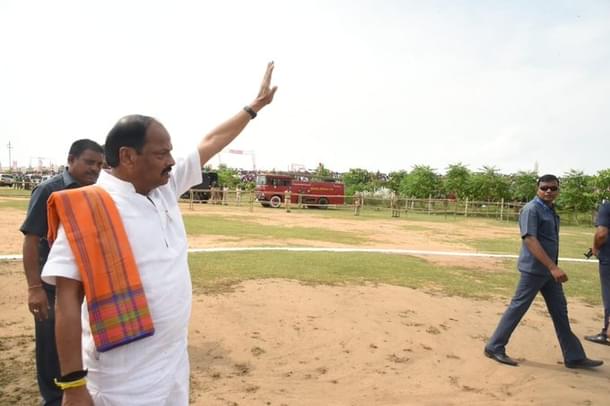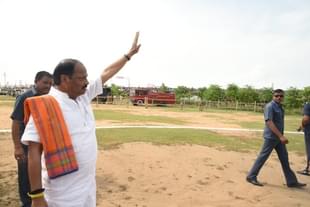Magazine
BJP Starts From Pole Position In Ranchi
Jaideep Mazumdar
Oct 04, 2019, 09:53 PM | Updated 09:52 PM IST
Save & read from anywhere!
Bookmark stories for easy access on any device or the Swarajya app.


This fact alone gives a lot of heft to the BJP going into the assembly election campaign.
The political slogan that rings loudest and most convincingly these days in Jharkhand is “abki baar, paisath paar” (this time, we shall cross 65). This is the ambitious target that the Bharatiya Janata Party (BJP) has set for itself in the polls to the 81-member Jharkhand Legislative Assembly that are expected to be held in November this year.
The target, though ambitious, is achievable. And for a number of reasons, the primary among them being that the BJP-led coalition government in the state that won 37 seats in 2014 was the first in the state’s history to last its full term of five years and as a result provide political stability.
On the other side, the opposition in Jharkhand is organisationally weak, wrecked by infighting and seems to lack the will to take on the BJP. Though the Jharkhand Mukti Morcha (JMM) and the Congress, which are in a loose alliance, are likely to rope in the Jharkhand Vikas Morcha (Prajatantik) into a ‘mahagathbandhan’, political pundits say even a combined opposition will fall short of gaining a majority in the elections.
It is widely believed that the forthcoming assembly election results will mirror that of the Lok Sabha results a few months ago. The BJP won 11 of the 14 Lok Sabha seats in the state while its ally — the All Jharkhand Students' Union (AJSU) — won one seat. The Congress and the JMM won one each.
But the major takeaway from the Lok Sabha polls was the embarrassing defeat of Shibu Soren, considered to be the state’s patriarch. Soren is a founding member of the JMM, which is credited with the victorious fight for the formation of Jharkhand.
Soren, popularly known as Guruji, was defeated from the prestigious Dumka seat, long considered to be a JMM stronghold, by his former disciple Sunil Soren of the BJP. Shibu Soren had won the Dumka seat 11 times since 1980, and to be defeated by a considerable margin of more than 26,000 votes by a political lightweight was a major blow to his stature and image, and also to that of the JMM.
Though assembly elections are usually fought largely on local issues, this time the contours of the poll battle will be different. “In Jharkhand, like in the rest of the country, the Lok Sabha polls were fought on the issue of national security and Modi was the face.
National issues — India’s growing stature in the global arena, the country’s masculine stand against Pakistan, the bold actions regarding Kashmir and crackdown on terrorists — will hold centre stage in the assembly elections as well, and Modi will again be the star campaigner along with party president Amit Shah. “People will vote for the BJP mainly because of Modi,” said Ramshankar Singh, a former professor of political science of Patna University who is now settled in Jamshedpur.
That is, adds Singh, “not to downplay the achievements of the BJP government” under Chief Minister Raghubar Das. For the first time since its formation in 2000, Jharkhand has witnessed political stability that has facilitated development and progress. For context, the state has witnessed three spells of President’s Rule and 10 chief ministers (including Das) over the last 19 years.
But not everybody agrees. Ratneshwar Thakur, Congress leader at Ranchi says that “this government is only good at making false claims. It has done nothing and people will reject it. The Lok Sabha polls were different, the results of the assembly elections will reflect popular discontent against this government”
Ramesh Mahato, a sociologist, says however that the proposed ‘mahagathbandhan’ does not inspire much confidence among the people.
“There have been failed coalition experiments in the past and the state has suffered terribly due to political instability. People know that a broad coalition (mahagathbandhan) of opposition parties will be an alliance of convenience and will not be able to ensure good governance and stability. The leaders of the mahagathbandhan partners will be continuously jostling for power and pelf and the state will suffer again. People don’t want that,” said Mahato.
The JMM, which is the principal opposition party, is no longer the force it used to be. Even the tribals (who form about 28 per cent of the state’s population) who once formed the backbone of the party have shifted allegiance, mainly to the BJP.
Says Lalit Mahato, a hardware store owner in Dumka: “All these years, the JMM has been talking about looking after the tribals but has done nothing for them. That is why Shibu Soren lost the Lok Sabha polls from Dumka, which is a tribal-majority constituency, this time”.
Shibu Soren, 75, is old and ailing, and his son and successor Hemant Soren does not command the respect that his father did. Though some other seniors in the party still have a following among the masses, Hemant has sidelined them. Hemant has also failed to retain the support of the influential Mahato community, which feels it has been sidelined by Hemant.
The Congress is a house in disarray after its state unit president Ajoy Kumar quit the party to join the Aam Aadmi Party (AAP) in September. Kumar, a former police officer credited with stamping out crime in Jamshedpur as the police chief there, has been a political turncoat but enjoyed a good reputation. Former Union minister Rameshwar Oraon is the new state Congress chief, but the party is riven by factionalism.
Oraon, a former police officer, had been charged with indiscipline in the past. The younger lot in the Congress is not happy with the appointment of a 72-year-old (Oraon) as the state party chief. And Oraon, say Congress leaders, has an autocratic style of functioning that will cause problems.
“The Congress unit in the state has five working presidents. That itself is an indication of the deep divisions within the party,” pointed out a senior BJP leader.
Laloo Prasad Yadav’s Rashtriya Janata Dal (RJD) is a spent force in the state with most of its senior leaders like Annapurna Devi having joined the BJP and the others having formed the RJD (Loktantrik).
The Jharkhand Vikas Morcha (Prajatantrik) led by former BJP leader Babulal Marandi is also a pale shadow of its former self. It won eight seats in the last assembly polls, but six of its legislators joined the BJP a year after the last elections.
Interestingly, Nitish Kumar’s Janata Dal (United) and the Lok Janshakti Party (LJP) have also thrown their hats in the political ring in Jharkhand. The JD(U) has decided to go it alone and field candidates in the tribal belts of the state.
“We will hold up the ‘Nitish model of development’ that has benefited Bihar and propose its replication in Jharkhand,” said JD(U) leader Lakshman Tiwari.
The LJP, a constituent of the NDA, is seeking six seats from the BJP, but may not get more than a couple.
But much more than a weak and faction-ridden opposition, it is the progress posted by the Raghubar Das government that will play on the minds of the electorate.
A number of irrigation projects which had been languishing were revived and while many have been completed, others are nearing completion. Many hectares of farmlands have come under irrigation and agricultural production and productivity has been increasing steadily.
Jharkhand has registered impressive increase in rural electrification and there have been major investments in the mining, information technology and education sectors. There has been a spurt in construction of roads and other public infrastructure over the past five years and the public distribution system has seen major improvements.
As per Shivanand Jha, professor at Annada College, Hazaribagh: “over the last five years, infrastructure
like roads has improved and there have been visible changes on the ground. The education sector has also seen improvement”.
The delivery mechanisms have been streamlined and direct transfer of benefits has weeded out corruption and benefited the poor. The Das government’s firm steps in preventing religious conversions that had become a social menace and strict enforcement of the ban on cow slaughter has also shored up support for the party from both the tribals and non-tribals.
The BJP, however, faces some bumps.
Raghubar Das is the first non-tribal chief minister of the state and many tribals resent this. Also, he has some strong rivals, primary among them being Saryu Rai, who had exposed the fodder scam in Bihar and enjoys a clean image.
Rai had openly revolted against Das many times and had even complained to BJP central leadership against Das’ style of functioning.
There have been murmurs of discontent against Das from other leaders within the party also. But state party chief Laxman Gilua says that such differences of opinion “are normal within a democratic party” and that “all will work unitedly for the party’s resounding victory in the assembly elections”.
In the final analysis, it is advantage BJP in Jharkhand. And the opposition parties have only themselves to blame for the ‘walkover’ they will hand to the BJP.





